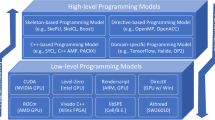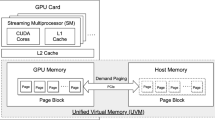Abstract
A parallel computer, which is loaded with processor in numerous commercial chips, is dropped performance due to the delayed time of seeing the increasing memories and to a burden for synchronization. To solve this, multithreaded is being used. Thread is partition by searching for a part available for performing sequentially when executing Non-Strict program in multithreaded. However, the existing partition divided the conditional expression by having predicate, true expression and false expression as the basic blocks, and applied partition to each. Therefore, the context switching frequency between synchronization and thread grew. This study proposes the secure thread partition policy in the conditional expression of dividing Non-Strict program into thread. Thread partition policy can lead to knowing the sequence of performance in the time of translation, thereby being what collects it with thread by distinguishing a part of program available for the static scheduling. As a result of experiment, the context switching frequency and the synchronization were reduced by generating big thread in the conditional expression compared to the existing partition. Accordingly, the performance of program in multithreaded model was improved.







Similar content being viewed by others
References
Iannucci, R.A.: Parallel Machines: Parallel Machine Languages: The Emergence of Hybrid Dataflow Computer Architectures, p. 240, Kluwer Academic Publishers, Boston, MA (1990)
Tevis, J.E.: Secure programming using a functional paradigm. In: Proceedings of the Illinois State Academy of Science Conference (2006)
Chang, W., Streiff, B., Lin, C.: Efficient and Extensible Security Enforcement using Dynamic Data Flow Analysis. In: ACM Conference on Computer and Communications Security, pp. 39–50. ACM, New York, NY (2008). doi:10.1145/1455770.1455778
Yip, A., Wang, X., Zeldovich, N., Kaashoek, M.: Improving application security with data flow assertions. In: ACM SIGOPS 22nd Symposium on Operating Systems Principles, ACM, London, pp. 291–304 (2009)
Manzino, C., Pardo, A.: A security types preserving compiler in Haskell. Programming languages. Lect. Notes Comput. Sci. 8771, 16–30 (2014)
Schauser, K.E., Culler, D.E., von Eicken, T.: Compiler-controlled multithreading for lenient parallel languages. In: 5th ACM Conference on Functional Programming Languages and Computer Architecture, LNCS, Vol. 523, pp. 50–72 (1991)
Glynn, K., Stuckey, P.J., Sulzmann, M., Sondergaard, H.: Exception analysis for non-strict languages. ACM SIGPLAN Not. 37(9), 98–109 (2002)
Park, R.C., Jung, H., Jo, S.M.: ABS scheduling technique for interference mitigation of M2M based medical WBAN service. Wireless Pers. Commun. (2014). doi:10.1007/s11277-014-2073-8
Robert, E., Jones, S.P.: Optimistic Evaluation: An Adaptive Evaluation Strategy for Non-Strict Programs. In: Proceedings of the ACM SIGPLAN International Conference on Functional Programming, pp. 287–298. ACM Press (2003)
Schauser, K.E., Culler, D.E., Goldstein, S.C.: Separation constraint partitioning—a new algorithm for partitioning non-strict programs into sequential threads. In: 21th ACM Symposium on Principles of Programming Language, pp. 259–271 (1995)
Chung, K.Y.: Recent trends on convergence and ubiquitous computing. Pers. Ubiquitous Comput. 18(6), 1291–1293 (2014)
Domoszlai, L., Bruël, E., Jansen, J.M.: Implementing a non-strict purely functional language in JavaScript. Acta Univ. Sapientiae 3, 76–98 (2011)
Oh, S.Y., Ghose, S., Jang, H.J., Chung, K.: Recent trends in mobile communication systems. Int. J. Comput. Virol. Hack. 10(2), 67–70 (2014)
Kim, J.H., Chung, K.Y.: Ontology-based healthcare context information model to implement ubiquitous environment. Multimed. Tools Appl. 71(2), 873–888 (2014)
Chung, K., Boutaba, R., Hariri, S.: Recent trends in digital convergence information system. Wirel. Pers. Commun. 79(4), 2409–2413 (2014)
Jung, H., Chung, K.Y.: Mining based associative image filtering using harmonic mean. Clust. Comput. 17(3), 767–774 (2014)
Ha, S., Han, S., Kim, H.: Partitioning a lenient parallel language into sequential threads. In: Proceedings of the 28th Hawaii International Conference on System Sciences, Vol. 2, pp. 83–92 (1995)
Hoch, J.E., Davenport, D.M., Grafe, V.G., Steele, K.M.: Compile-time partitioning of a nonstrict language into sequential threads. In: Proceedings of 3rd IEEE Symposium on Parallel and Distributed Processing, pp. 180–189 (1991)
Xinan, T.: Thread Partitioning and Scheduling Based on Cost Model. In: Proceedings of the Ninth Annual ACM Symposium on Parallel Algorithms and Architectures, pp. 272–281 (1997)
Boutaba, R., Chung, K.Y., Gen, M.: Recent trends in interactive multimedia computing for industry. Cluster Comput. 17(3), 723–726 (2014)
Kim, J.H., Ryu, J.K.: Recent trends on high-performance computing and security. Clust. Comput. 16(2), 207–208 (2013)
Nikhil, A.R.S., Pingali, K.K.: I-Structures: data structures for parallel computing. ACM Trans. Program. Lang. Syst. 11(4), 598–632 (1989)
Jan, C.: Investigating Minimally Strict Functions in Functional Programming. Doctoral Dissertation, Kiel, Christian-Albrechts-Universitat (2011)
Thompson, S.: Haskell: The Craft of Functional Programming, International Computer Science Series, 3rd edn. Addison Wesley Publishing Company (2011)
Traub, K.R.: Culler, D.E., Schauser, K.E.: Global analysis for partitioning non-strict programs into sequential threads. In: Conference on Lisp and Functional Programming, pp. 324–334 (1992)
Author information
Authors and Affiliations
Corresponding author
Additional information
Special Issue: Convergence Security Systems.
Rights and permissions
About this article
Cite this article
Jo, S., Chung, K. An efficient thread partition policy for secure functional language. J Comput Virol Hack Tech 11, 165–171 (2015). https://doi.org/10.1007/s11416-014-0234-7
Received:
Accepted:
Published:
Issue Date:
DOI: https://doi.org/10.1007/s11416-014-0234-7




